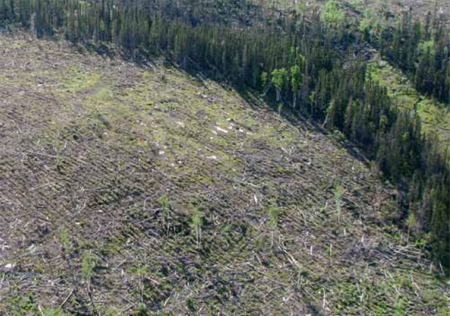Leaders, scientists, and other experts will be travelling to Copenhagen next week to work on building an international climate agreement to lessen the escalation of climate change. While commonly-known sources like transportation, production, and manufacturing will be hot topics, it's important that those at the table also recognize the importance of another large source of emissions: the loss and degradation of natural habitat including forests and peatlands.

Clearcutting in Ontario's Boreal Forest
Credit: Jeff Wells
The loss and degradation of forests is actually a large portion of our global emissions, as carbon stored in trees, peats, and soils are released upon logging and other industrial disturbances. There is a growing international effort to get leaders to see the potential in conserving forests as a mitigation strategy. Protecting our world's forests will not only prevent future emissions from development, but it will also provide more space and geographic diversity for plant and animal species to adapt to the changing conditions brought on by climate change.
Our friend Chris Henschel over at Canadian Parks and Wilderness Society (CPAWS) recently wrote an op-ed in the Montreal Gazette highlighting the importance of protecting our forests, and in particular our boreal forests. Here's an excerpt - a link to the full op-ed is below, as well as a link to an action you can take to tell leaders to make forests count:
"There is simply no way to deny that cutting trees down causes the carbon stored in forests to be released into the atmosphere, creating greenhouse gases. If we're lucky this carbon will eventually grow back. But if we don't create a cost to the emission, we won't provide any incentive to forest companies and governments to do things differently, like protecting forests, or letting them get older before cutting them down. Putting a price on carbon will offer incentives for forest companies to do two beneficial things: Optimize the use of the wood that they cut, and reduce emissions.
Not surprisingly, developing countries participating in the climate-change negotiations are not buying the convoluted rationales offered by developed countries for continuing business as usual in our forests. They rightfully point out that the options proposed by the developed countries have zero environmental integrity.
So what's the solution? How can Canada and other developed countries come up with a path forward within the next global climate-change agreement that will actually help to protect the carbon stored in our forests?
It's not that complicated. Put simply, developed countries need to agree that within the next set of climate-change rules they will commit to protecting intact forests and wetlands, and fully account for any changes in emissions from cutting forests and destroying wetlands.
It's time for developed countries to stop creating fancy hypothetical models and start committing to measuring changes in actual emissions from forestry activities within their borders. Simple transparency, simple accountability. This approach does have some champions within the European Union, France in particular. In Barcelona, Canada's representatives expressed an openness to consider this approach; now we need them to put it down on paper."
Click here to read the full op-ed >
Take action: Make Forests Count >

